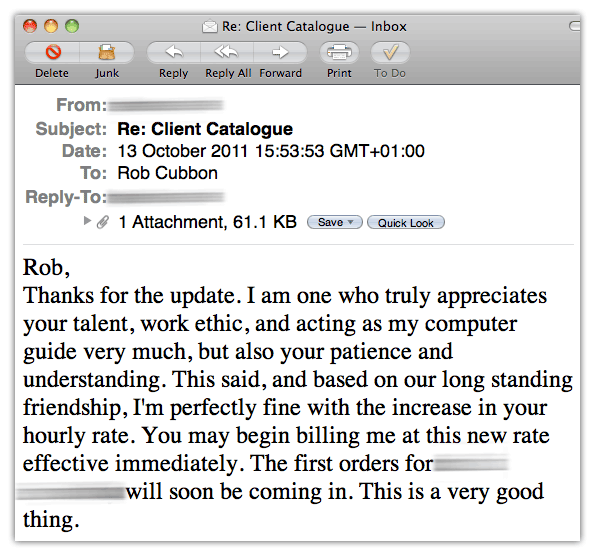Web designers are, generally, afraid to raise their prices.

However, a good web designer will develop a website for a client that, if regularly updated, will be a powerful marketing tool for years to come. And, that,s worth money.
The client billing life-cycle
Usually, if you,re billing for website design and development, you start off charging fixed rates for specific jobs.
After that, you develop a good relationship. And what does a good business relationship mean? One word: Trust.
So, now the client trusts you and you move to an hourly rate. The client doesn,t want to over-pay if you over-estimate a job and charge too much. You don,t want to be out-of-pocket if a project takes longer than expected.
So, with some consultant/client relationships, the hourly rate is mutually beneficial.
Raising prices due to “inflation”
However, after a while you can no longer justify working at the hourly rate set up when you were starting out.
One of the hardest emails I ever had to write was to inform a couple of regular clients that I was putting up my hourly rate. Here is a sample from the email. Feel free to use it yourself:
I thought I,d mention that, as I have increased my hourly rate for my clients to $XXX/hour to reflect price rises in the industry here and abroad, I will want to increase your rate at some point in the future. Of course, you always get a special rate because we,ve been working together for a while and I really enjoy working with you. However, next year I will have to review the hourly rate with you.
Here,s how the client responded:

As you can see, this was a few years ago when there was a bit more inflation than now. Even so, I was flabbergasted by the positive response from my clients. It shows the benefit of the strong business relationship.
Increasing hourly rate for new clients
As alluded to above. You don,t necessarily have the same hourly rate for all your clients. So, if you feel your experience and skillset has improved, you can ask for higher hourly rates from your new clients.
However, I don,t like to do this too much. I prefer the same rate for all clients as it keeps things simple.
Priority surcharges
This is another great idea for increasing prices from my friend John Romaine.
If a client phones you or emails you in the evening and wants something doing straightaway, you can add a 30% priority surcharge to your hourly rate.
Keep it professional
Remember you are a design business not a freelance designer. Don,t be too “pally” with clients. If you are too friendly with them, they may start to expect “friend’s rates”.
Late payment charge
It,s sometimes a good idea to add to your invoices and/or contracts that after a certain time (30 days, for example) a certain percentage (4% above bank rate, for example) will be charged as interest on outstanding balances.
This is something you should only use very sparingly.
Making sure you get paid for “project creep”
Project creep (sometimes referred to as “scope creep” or “brief creep”) is where you are asked for extra features or functionality that weren,t mentioned before. Project creep is the bane of a web designer,s existence as means extra work for no money.
Avoid project creep (or get paid for it) by specifying both deliverables and exclusions in the contract or proposal.
Specify exactly what you will do and what you won,t do for the project. All extras should be charged at an agreed hourly rate.
Don,t publish or advertise your rate
I would never put any of my rates online – hardly anyone does and there,s a good reason for this.
Don,t get greedy
Above all, charge a fair rate for a premium service. This is the only way to run a successful web design business.
You can do it
You ask for premium rates as long as you provide premium service. This way you,ll have a successful long-term online business.

Thanks for sharing! Love all of these tips.
I do have a question about not publishing your rates (and maybe it has to do with target audience) but I got almost NO work before I published a few “base†prices for my services. Why do you recommend not publishing them?
I do work primarily with micro-businesses and some bloggers, so they tend to have a limited budget, but before I published base prices for my packages I spent tons of time quoting people who would just come back and say, “you’re too expensive.†Now those people get weeded out before they bother to email.
Curious to hear more about your opinion on this!
I love all your tips, Erin. I loved your post on not undervaluing your work. Lots of people are asking about my comment there saying don’t publish your rates.
Maybe I should have thought that one out a bit before I wrote it. I’ve never published my rates and I’ve always thought that makes it easier to charge different rates to different clients and increase them for new clients.
I appreciate that micro-businesses and bloggers have small budgets and it’s good to weed out people looking for a bargain, but I can usually sniff out a low-paying nightmare client long before I engage with them.
Sorry, I haven’t explained that particularly well.
Makes sense–I don’t really publish rates for coding work because it really depends on the project. I only really publish base rates, which projects are almost always over because they’re bare-minimum. At this point I do have all of my clients at the same rate, but that does make sense if I were to increase rates later and keep my old clients at a lower rate.
Also, project creep is a HUGE issue for me, and I have trouble saying no.I know I should do it, it’s just really hard! Even if it’s not in the contract and clearly not part of the project, I’m a HUGE over-deliverer and often end up doing the work anyhow.
You should do a post (if you haven’t already) on how you screen clients. I’ve gotten better at it, but still run into cases where I waste too much time to just have them change their mind or they end up being really difficult to work with.
It’s good that you point out that they are “base ratesâ€, Erin, that gives you room from maneuver.
I did a post called How To Deal With Nightmare Clients in which I tried to list the red flags I look out for as well as explaining a bit about how to limit the extent of the job before you start.
Another way to avoid project creep is just to insist the client buys a full package which includes registering with Google Webmaster Tools, Google Analytics, on-page SEO, etc., all the usual stuff they ask for during project creep so that you’ve covered all bases plus give them a website that is of great use.
Hi Rob
Useful read.
I have no problem uping rates, but an area that does baffle me is what to charge WordPress clients for updates to WordPress, themes and plugins.
The time taken to upgrade is usually (touch wood) minimal, so charging by the hour is hardly appropriate. How do you handle updates?
Another area of charging is web hosting. I have a reseller package with a fairly cheap provider and I put all my clients on that. That means I have to think about security plugins etc. I notice that some guys in the US put their clients on WP Engine and then they can forget about security. Don’t think that my small business clients could afford WP Engine!
How do you deal with hosting and security?
Kieth – Check out Zippykid. They are a managed WordPress host with really affordable pricing for multiple sites. Free nightly backups, free Akismet, free CDN, and extremely secure.
@Rob – Project creep will get you every time, while its easy to write up what is included, its sometimes tricky to define what’s not included. Clients like to find loopholes in that one.
I hear you, Greg, there are always issues even with the best laid plans. 🙂
Yes, I usually lump the hosting with the maintenance fee and I’ve learned to keep this as high as possible because there will be problems, sometimes.
And, having said that, yes there’s a lot of options when it comes to administering a lot of WordPress installs via one dashboard. I’ve never used any of them and I would like to hear of good solutions.
I give all my clients a detailed quotation. I specify how many graphics per page etc.
I also ask for 50% before I begin work.
Once they have accepted the quotation and I have their 50% I start work.
That’s the way to do it, Keith.
Great minds Rob – great minds.
Took me a while to get there but that’s what I do now.
Cheers Rob.
🙂
Two questions:
1) How come you won’t publish or advertise your hourly rate?
2) Do you give clients purchase order before you start a project?
Angela
Hi Angela,
1) See my answer to Erin’s comment above.
2) Not a purchase order. But with new clients I have a contract written up which is similar to the proposal I talked about on my previous post.
Hope this helps.
where is that written contract? is that included in your book Running A Web Design Business?
There’s reference to it in the book, Angela. But I’ll mail you the web contract I use as I amended it from one I downloaded from the web ages ago so it’s not really “mine”.
Thanks Rob,
Another good example of your communication with clients Really helpful.
I too pondered over the advice on rates. I see the benefits of you suggestion, but at the same time there seems to be a lot of designer who scoff when clients come to them with unrealistic budgets. I don’t know much about it but I feel a lot of the client/designer problems start because designer websites tend to focus on showing the finished job ( the pretty stuff) rather than the process of designer for. If that make any sense.
That’s a really good point, David, designers will focus on pretty looking websites on their portfolios and not mention the nitty-gritty that goes on under the hood. It’s always a process of education with most clients about what needs to be done and too often it gets glossed over and that’s where the problems can start.
Hope you’re well. 🙂
Very encouraging! Thank you, Rob. Honest, open communication is the only way to conduct one’s client relationships for long term profitability.
I have seen over the last couple of years of running my website design business that the most modest arrangements can steadily develop into increasing profitable relationships – with very tangible mutual benefits.
The skill of presenting an attractive proposal targeted at alleviating the pressure point of a client can go a long way to increasing the shelf life and net value of an initial agreement.
By the grace of God we have been in business now for about 3years and our family business of web design / online marketing has largely been our sole household income.
New business always feels good to get, but long standing business arrangements is really where the profits are!
I can’t disagree with a word you say there, G Cole. I love the idea behind your website as well, and I love the quote calculator as well.
Yes, it’s all about long term professional relationships. 🙂
Hi Rob, I love your blogs.
Can you please provide me also with the webcontract.
I am just starting in the design world I have to learn new competences as well as designing a website, coming from the financial world and I am also sruggling to make a question list I can provide my clients as what their needs are make them think about their site themselves, to get them active in the process so i can save time during the design process and make sure what is included and excluded.
Like in the financial world I would like to make the process transparent as it can be so both the customer and myself have a clear understanding of what is included and excluded in designing the website and get the cliënt involved in the whole process. Make them important
Regards,
Marcel
Hello Marcel, it looks like you are on the right track with your attitudes towards clients. The questions I ask them about their website, for example, are pretty obvious: what is the purpose of the website? who are your target markets? what is the one action you would like users to take upon visiting your website? Etc. Marcel, could you contact me and ask me for the contract? I downloaded it from the internet so it’s not really mine to give away. Thanks for the comment. 🙂